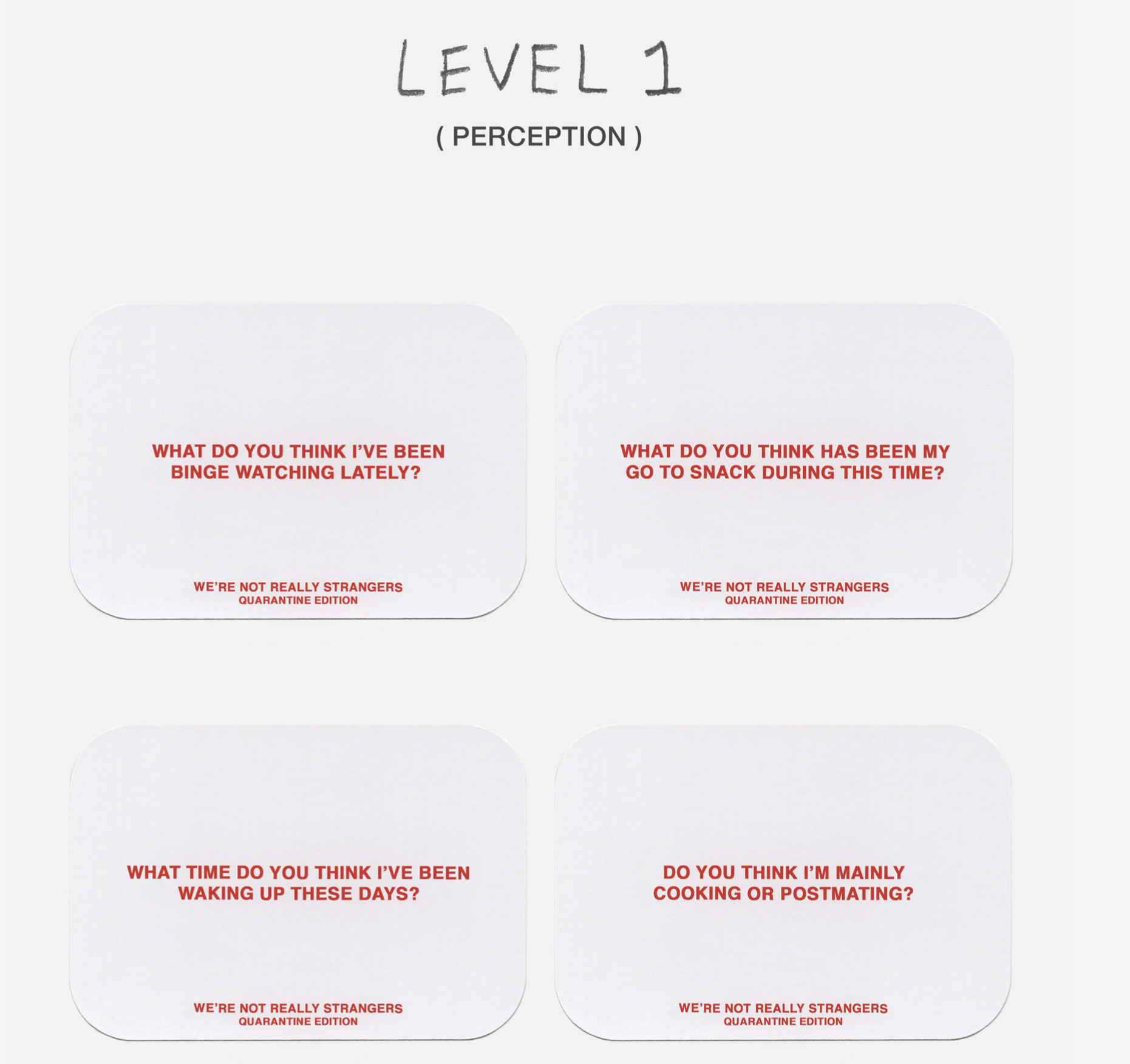For project 1, my team’s game, Worrywrecker, is an exploration of fear and vulnerability with those around you, people who may or may not be close friends (yet). In this way, it is all about getting to know others and shares many similarities with We’re Not Really Strangers. Created by entrepreneur Koreen Odiney in Los Angeles when she was 25, the card game claims to deepen connections between people, whether they’re strangers or already friends. To focus in on ideas of vulnerability and connection, I decided to play the Quarantine Edition pack for the game, with questions designed to be answered virtually and that tackle the fraught world we found ourselves in as a society during the pandemic that started in 2020.
An example of some of the cards I played with from the Quarantine Edition card pack.
While both We’re Not Really Strangers and our game Worrywrecker hope to foster connections between people, We’re Not Really Strangers has a more informal system of rules and mechanics that focus on divulging information within a group, while our intended game also hopes to help alleviate concerns and issues players might have by introducing a problem solving mechanic into gameplay.
We’re Not Really Strangers (WNRS) employs a card-based gameplay mechanic as mentioned above, where players draw cards and answer the questions posed on them to the audience of their fellow players. These cards serve as prompts for deep and meaningful conversations, guiding players through various themes. To separate the types of prompts, the game is structured into levels, each containing questions of increasing depth that require more thought, encouraging players to gradually delve into more personal and vulnerable territory. As a mechanic, this leveling categorization of the cards creates and fosters a natural progression of trust among players. As an act of vulnerability from another often psychologically makes a person feel safer to be vulnerable themselves, a type of feedback loop of increasing vulnerability is generated. While a group might start as merely acquaintances, through finishing level 1 and moving on to the subsequent levels they can take part in deeper connections as they build the trust necessary for such intimate conversations.
The above cards are part of level 3’s set, the highest level in the pack.
This dynamic then leads into a sense of fellowship as discussed within the MDA framework. This is something that WNRS has in common with Worrywrecker, as we implement a similar leveling mechanic to our prompts to hopefully foster the same effect.
However, the games diverge after the initial answering of the prompt. While WNRS encourages players to “reflect” upon their own answers and the answers of their fellow players, this mechanic is informal and focuses more on the aspect of divulging information, rather than what to do with it once it has been revealed. This, combined with the fact that questions span a wide range of topics, means that the reflection stage can involve making connections to other players’ responses but doesn’t necessarily facilitate real-world application of the new connection.
While the above card could be difficult to share with other players, it doesn’t necessarily foster any further actionable steps to reduce screen time, for example.
Worrywrecker’s prompt system, on the other hand, focuses on concerns, fears, or doubts that the players might have in a variety of situations or aspects of their life and then calls for a brainstorming session, in which players can provide potentially useful feedback and solutions for these problems. While WNRS facilities sympathizing with your fellow players, I’ve found that it doesn’t quite promote empathizing as its classically known. Worrywrecker, on the other hand, encourages players to put themselves in the shoes of those playing with them in order to come up with practical (or not so practical) solutions, thereby creating a sense of true empathy within the group.
In the end, We’re Not Really Strangers and our team’s game share many similarities, and we were very inspired by the card-based mechanics and the ability to scaffold trust within the group to achieve higher levels of vulnerability after relatively short periods of play. However, our game decides to focus on empathy and problem-solving through the shared brainstorming portion of gameplay, while WNRS focuses instead on the aspect of self-reflection and divulgence entirely.





